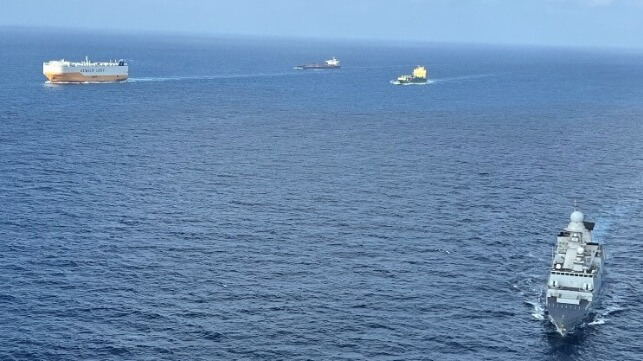Report: Houthis Made Political Deal with Russia and China for Safe Passage

For the second time this year, it is being reported that the Houthi militants in Yemen are promising safe passage for vessels associated with Russia and China while the group continues its daily assaults on shipping in the Red Sea and Gulf of Oman. It is further evidence of the commenters’ view that the Houthis are using the war in Gaza as a lever to gain more prominence on the world stage.
A political understanding has reportedly been reached between the Houthi and Russian and Chinese diplomats meeting in Oman according to unnamed sources cited in a story released by Bloomberg this morning. While the terms of the agreement are unknown, Bloomberg speculates that China and Russia promised further political support to the militants including possibly blocking resolutions at the UN Security Council in exchange for the promises of safe passage.
Ships transiting the Red Sea informally began highlighting their association with China after the attacks began. They have included on their AIS signals messages such as “all Chinese crew” or highlighted destinations in China. This led to reports from Agence France Presse in January that a Houthi spokesperson was telling Russian media that ships from Russia and China were safe as long as they were not directly associated with Israel.
Yet, despite the previous assurances of safe passage, tankers carrying Russian oil have been among the vessels targeted by the Houthi. Reports have repeatedly suggested that the Houthis are using inaccurate or outdated data in their targeting leading to assaults on ships they protest to be American while they are now owned by companies in Greece and Singapore.
“Houthi attacks on ships in the Red Sea, coupled with a rise in piracy off the coast of Somalia, are disrupting global trade,” BIMCO the shipping industry trade group yet again reiterated in its weekly update. The group sought to quantify the scope of the impact noting, “In 2023 an estimated 13 percent of global seaborne trade transited through these areas. However, the attacks have reduced the number of ships transiting the area by 50 percent,” said Filipe Gouveia, Shipping Analyst at BIMCO.
The attacks show no sign of abating despite the increased international presence in the region. The EU mission reports in its first month the effort known as Aspides provided “close protection” for 35 merchant vessels and its defensive actions led to shooting down eight UAVs and repelling three other UAV attacks posing a threat to the freedom of navigation.
Yesterday, the French released a video showing one of their helicopters shooting down a Houthi drone targeting merchant ships. Aspides reported today that a French warship while providing close protection to merchant shipping in the South Red Sea, intercepted and destroyed three ballistic missiles.

that matters most
Get the latest maritime news delivered to your inbox daily.
U.S. Central Command now issues a daily end-of-day summary which for example reports on March 20 a coalition aircraft successfully engaged and destroyed one unmanned aerial vehicle while U.S. forces destroyed one unmanned surface vessel. Days earlier on March 18, CENTCOM said forces successfully engaged and destroyed seven anti-ship missiles, three unmanned aerial vehicles, and three weapons storage containers in Houthi-controlled areas of Yemen.
The Houthi leader last week vowed to extend the attacks further into the Indian Ocean saying they were intent on disrupting shipping rerouted for the passage around Africa. Analysts are increasingly saying that despite the statements that the attacks are in support of the Palestinians, they believe the Houthi will continue as it has given the once obscure group international attention.
